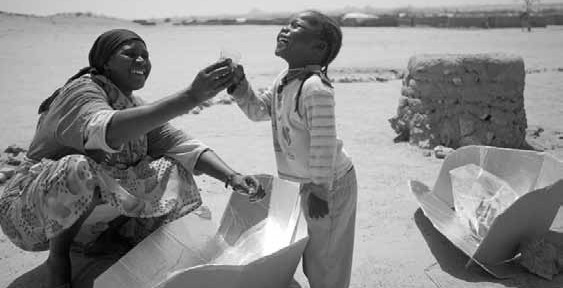
Recognizing the Power of Simple Solutions
Darfurian women have been routinely raped when leaving the relative safety of their refugee camps in Chad to collect scarce firewood needed for cooking. Rachel Andres helped to stop this.
“At first, we tried more traditionally ‘Western’ responses,” says Andres. “Things like counseling and rape crisis centers. But eventually we realized that the rapes mostly happened when the women left the camp, so we started to think about ways to eliminate that from the process.” The answer, as she and her team soon found, was a model of simplicity. Solar cookers, devices composed mainly of cardboard and tinfoil, cost only about $15. Andres and her colleagues distributed them to women in the Iridimi refugee camp in Chad, along the Sudanese border. Not only did these devices radically reduce the rapes (in the first phase of the project alone, visits outside the camp dropped 86%), but they also relieve environmental pressures in an area plagued by deforestation, and help generate income for the women trained to use them.
In May, the 2008 Charles Bronfman Prize was awarded to Andres, Director of the Solar Cooker Project for Jewish World Watch (JWW). Chosen from amongst applicants from 16 countries, Andres represents this year’s “visionary humanitarian effort.”
Jewish World Watch, an organization founded four years ago by Rabbi Harold Schulweis and Janice Kameir-Reznik in response to the genocide in Darfur, roots its activism in the injunction of “Do not stand idly by.” Andres, whose grandmother lost her family in the Holocaust, says her work also grew out of Jewish values — as well as years of work in the Los Angeles Jewish community. Over 60 synagogues in the Los Angeles area, along with churches, schools, Girl Scout troops, BBYO chapters and individuals in the U.S., Canada and Australia, have pitched in. Because each family needs two cookers, JWW asked for donations of $30, making this “affordable philanthropy.”
Andres is the first woman to win the Bronfman prize, now in its fourth year. She hopes that the $100,000 award and the press it garners for JWW will allow the Solar Cooker Project to spread to other refugee camps, and bring attention to the women and children whose everyday lives are still brutally affected by the crisis. “Facing a problem — a genocide — so horrendous and of such huge scope, it’s easy for people to doubt that we can make any difference,” Andres explains. “But even a simple solution can change thousands of lives. It’s worth working on smaller, simpler projects, because every piece we can fix makes their lives a little more bearable.”

